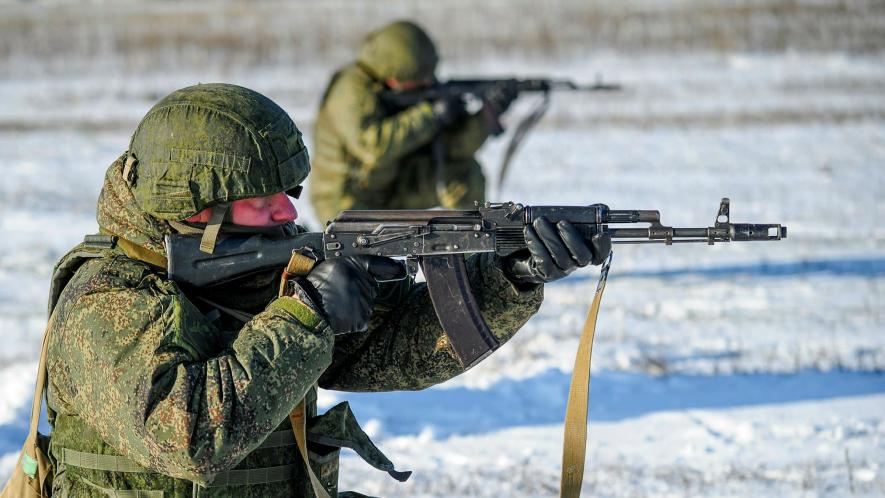Russia’s ‘Asymmetrical’ War over Ukraine

Image Courtesy: AP
The formal US response to Russia’s demands for security guarantee was delivered to the foreign ministry in Moscow on Wednesday. Moscow’s worst fears came true: Washington simply ducked without addressing the main Russian concerns — NATO’s expansion, rollback of NATO deployments to pre-1997 level, etc. —and instead offered to discuss confidence-building measures.
Nonetheless, Moscow will only take the dialogue route, as it is in Russian interests not to appear obdurate, although if past experience is any guide, CBMs (confidence building measures) with US last only until it abandons them.
Russian President Vladimir Putin, in his annual address to the Russian Parliament last April, had clearly drawn the “red lines” that much as Moscow wants good relations with other countries and “really don’t want to burn bridges… if someone mistakes our good intentions for indifference or weakness and intends to burn down or even blow up these bridges, they should know that Russia’s response will be asymmetrical, swift and harsh.”
Russian officials have since repeatedly underscored, including this week, that there is no compromise possible on any further expansion of NATO or the alliance’s deployments on the borders. In fact, Russia’s “asymmetrical” reaction is already unfolding.
Potentially, there are three key templates in play. The first, of course, is the demand this week by Russia’s Communist Party to accord recognition to the separatist regions in Donbass in eastern Ukraine, which was followed by a call from the ruling party, United Russia, urging the government to render all military and economic support necessary to those regions to withstand any aggressive moves by Kiev.
The Russian Parliament may well endorse these demands. Now, if Kiev intervenes militarily to stop the emergence of Donetsk and Luhansk as independent entities and threatens the security of the region’s Russian population, that will be casus belli for intervention by Moscow, which will be left with no option but push back the Ukrainian forces and create a buffer anywhere up to the Dnepr river.
A second template that is becoming kinetic is the energy front. The fact of the matter is that Russia’s major energy exporter Gazprom has been pumping gas in accordance with existing contracts with European countries. But the gas flow to Germany through the Yamal pipeline ended on December 21.
Moscow has not made any announcement in this regard and probably expects that it is a matter of time before the German authorities give approval for the newly-built Nord Stream 2 pipeline, which has a massive capacity to supply 55 bcm annually.
The price of Russian gas is very competitive. The average price of Russian gas is around $280 for 1,000 cubic metres (whereas, spot market price recently touched $2,000.) Thus, the US cannot compete with Russia in the European market and a need arises to evict Russia from its status as the leading supplier.
However, even if the US finds a way to boost LNG deliveries to Europe, energy prices would jump. Equally, other gas exporting countries — Norway, Algeria and Qatar — lack the surplus capacity to cover the shortfall in Russian gas supplies to Europe.
Thus, Nord Stream 2, which Washington wanted to kill in its cradle, has become a test of the EU’s strategic autonomy. Washington thinks that the delay in clearing Nord Stream 2 will put pressure on Moscow to back off in Ukraine since Russia stands to earn more than $15 billion annually out of the pipeline. (Russia invested around $11 billion in the pipeline’s construction.)
Moscow has warned that holding Nord Stream 2 hostage will be “counterproductive.” And it is doubtful that the Kremlin could be browbeaten to give up on its vital security concerns — NATO expansion, etc. — for the sake of salvaging the gas exports to Europe.
Russia has huge currency reserves and can afford take some financial losses. Besides, Russia is shortly signing the deal for the Power of Siberia 2 pipeline to China with a massive capacity of $55 bcm. If push comes shove, Russia will replace the European buyers with Asian customers such as Japan, South Korea and India.
The third template of Russia’s asymmetrical response concerns an altogether intriguing sphere — Ukraine’s internal politics. Ukrainian President Volodymyr Zelensky heads an unstable regime with an eroded power base. The ultra-nationalist right-wing elements call the shots in Kiev. As things stand, Zelensky’s prospects of getting a second term in the presidential election in March 2024 do not look good.
If Ukraine suffers a military defeat, Zelensky’s fate is sealed. That said, the virulently anti-Russian extremist paramilitary groups who are present on the contact line with Donbass may consider it expedient to provoke a conflict, egged on by Western intelligence, triggering Moscow’s intervention.
Clearly, annexation of Ukrainian territory or an outright invasion of Ukraine is not in the Russian calculus, but if the security of millions of Russians in the Donbass gets jeopardised, Moscow cannot remain indifferent.
The US knows it, and Zelensky knows it. That’s why Zelensky and his defence minister Oleksiy Reznikov stepped out of line lately and began tamping down tensions, even declaring that Moscow is not contemplating aggression.
Reznikov (who once served in the Soviet army) was quoted saying on December 24 after a meeting with lawmakers in Kiev, “As of today, the Russian army has not formed a strike group that would be able to carry out an invasion. There are no grounds to think that an invasion will happen tomorrow from a military point of view.”
Things came to a head today with the CNN reporting that President Biden had a difficult 80-minute conversation with Zelensky trying to convince him that a Russian invasion was imminent and Moscow intended to remove him from power.
According to CNN, in the “long and frank” conversation, Zelensky disagreed and estimated that the threat from Russia remains “dangerous but ambiguous,” and it is not certain that an attack will take place.
A second CNN analysis today further reported on “New signs of a fracture between the US and Ukraine over the imminence of a possible Russian invasion…Frustration in Kyiv has mounted in recent days over escalating US rhetoric on the crisis.”
What needs to be factored in here is that Zelensky won the election in 2019 with big support from ethnic Russian voters on an electoral platform that sought improvement of relations with Russia and a settlement in Donbass.
Of course, after coming to power, under immense pressure from the Rightwing Ukrainian nationalists who commanded street power and manipulation behind the scenes by Western powers, Zelensky changed course and began pursuing anti-Russian policies.
Zelensky realises that he is certain to be the fall guy if the current tense standoff with Russia leads to a war. The tragedy is that he is no longer in control of the contact line with Donbas where US mercenaries are present. His priority will be to see another day and retrieve the lost political ground before the election in 2024.
Moscow has a terrific grasp of the undercurrents of Ukrainian politics. Significantly, Foreign Minister Sergey Lavrov reiterated today through the state media that “The Russian president has said: if Zelensky wants to discuss normalising bilateral relations…, we are ready for this, no problem. Let him come to Moscow, Sochi or St. Petersburg.”
Get the latest reports & analysis with people's perspective on Protests, movements & deep analytical videos, discussions of the current affairs in your Telegram app. Subscribe to NewsClick's Telegram channel & get Real-Time updates on stories, as they get published on our website.























